SSC109e TMA01: Analyzing Class Division in Singapore's Society
VerifiedAdded on 2023/04/24
|8
|2118
|252
Essay
AI Summary
This essay examines class division in Singaporean society, addressing its significance as a social issue within the context of social sciences. It critiques the role of education in perpetuating social divisiveness rather than promoting social mobility, highlighting how parental background and elitist attitudes contribute to a 'closed system' of stratification. The essay further explores the influence of class divisions on Singapore's political sphere, particularly concerning meritocracy and talent allocation, and how these divisions affect citizens' faith in governance. Ultimately, it advocates for a more inclusive approach to address class divisions, emphasizing the need for educational reforms and addressing housing issues to ensure equal opportunities for all Singaporeans. Desklib offers a wealth of similar resources for students.
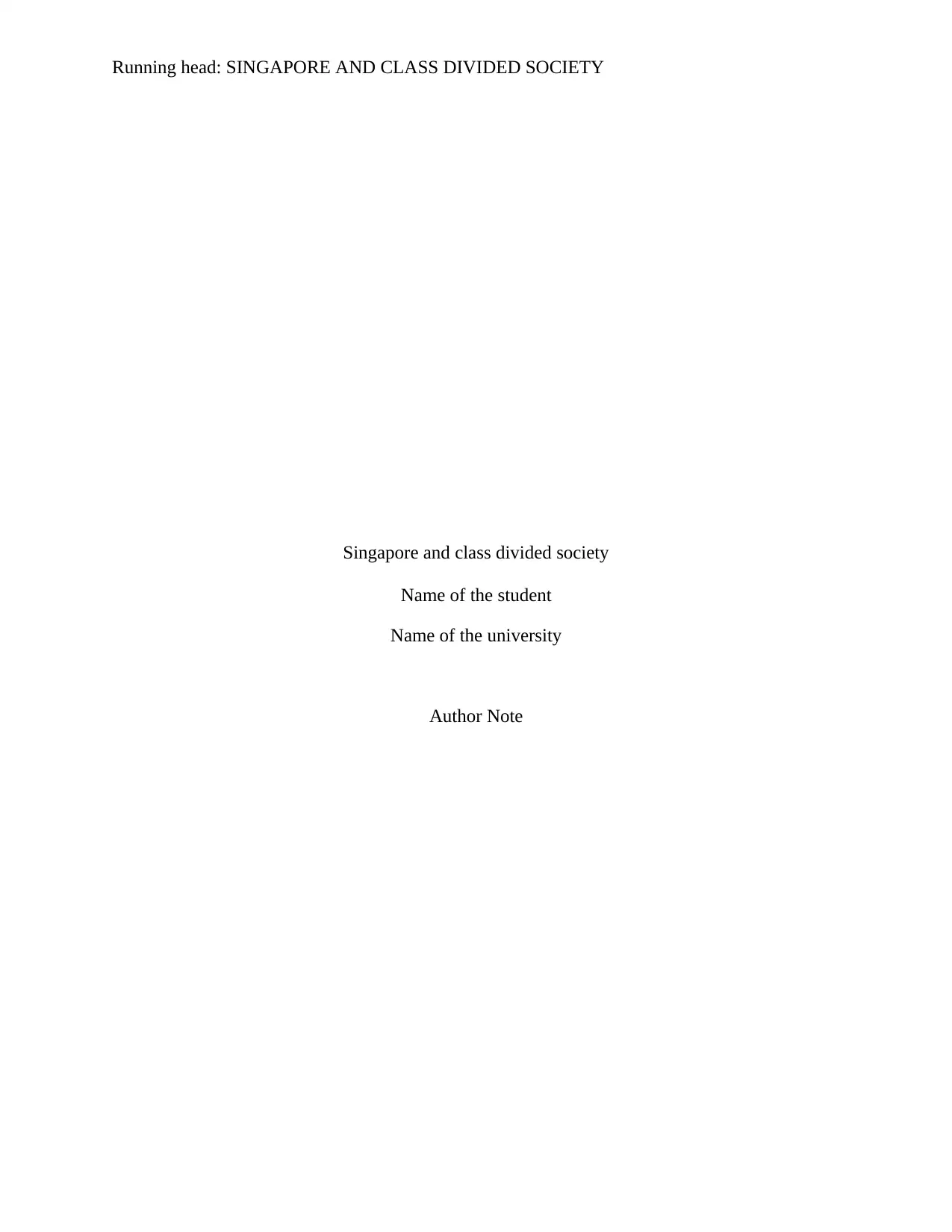
Running head: SINGAPORE AND CLASS DIVIDED SOCIETY
Singapore and class divided society
Name of the student
Name of the university
Author Note
Singapore and class divided society
Name of the student
Name of the university
Author Note
Paraphrase This Document
Need a fresh take? Get an instant paraphrase of this document with our AI Paraphraser
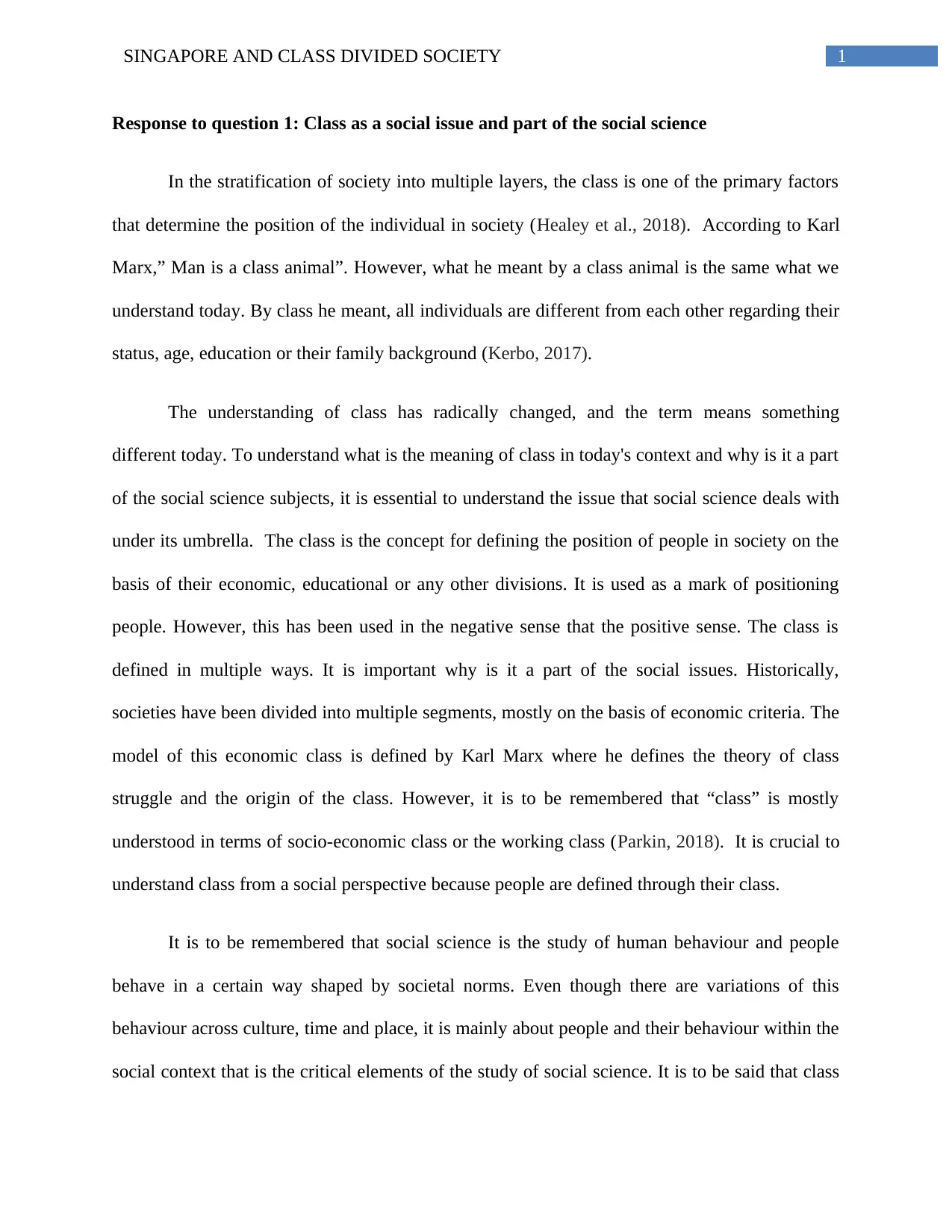
1SINGAPORE AND CLASS DIVIDED SOCIETY
Response to question 1: Class as a social issue and part of the social science
In the stratification of society into multiple layers, the class is one of the primary factors
that determine the position of the individual in society (Healey et al., 2018). According to Karl
Marx,” Man is a class animal”. However, what he meant by a class animal is the same what we
understand today. By class he meant, all individuals are different from each other regarding their
status, age, education or their family background (Kerbo, 2017).
The understanding of class has radically changed, and the term means something
different today. To understand what is the meaning of class in today's context and why is it a part
of the social science subjects, it is essential to understand the issue that social science deals with
under its umbrella. The class is the concept for defining the position of people in society on the
basis of their economic, educational or any other divisions. It is used as a mark of positioning
people. However, this has been used in the negative sense that the positive sense. The class is
defined in multiple ways. It is important why is it a part of the social issues. Historically,
societies have been divided into multiple segments, mostly on the basis of economic criteria. The
model of this economic class is defined by Karl Marx where he defines the theory of class
struggle and the origin of the class. However, it is to be remembered that “class” is mostly
understood in terms of socio-economic class or the working class (Parkin, 2018). It is crucial to
understand class from a social perspective because people are defined through their class.
It is to be remembered that social science is the study of human behaviour and people
behave in a certain way shaped by societal norms. Even though there are variations of this
behaviour across culture, time and place, it is mainly about people and their behaviour within the
social context that is the critical elements of the study of social science. It is to be said that class
Response to question 1: Class as a social issue and part of the social science
In the stratification of society into multiple layers, the class is one of the primary factors
that determine the position of the individual in society (Healey et al., 2018). According to Karl
Marx,” Man is a class animal”. However, what he meant by a class animal is the same what we
understand today. By class he meant, all individuals are different from each other regarding their
status, age, education or their family background (Kerbo, 2017).
The understanding of class has radically changed, and the term means something
different today. To understand what is the meaning of class in today's context and why is it a part
of the social science subjects, it is essential to understand the issue that social science deals with
under its umbrella. The class is the concept for defining the position of people in society on the
basis of their economic, educational or any other divisions. It is used as a mark of positioning
people. However, this has been used in the negative sense that the positive sense. The class is
defined in multiple ways. It is important why is it a part of the social issues. Historically,
societies have been divided into multiple segments, mostly on the basis of economic criteria. The
model of this economic class is defined by Karl Marx where he defines the theory of class
struggle and the origin of the class. However, it is to be remembered that “class” is mostly
understood in terms of socio-economic class or the working class (Parkin, 2018). It is crucial to
understand class from a social perspective because people are defined through their class.
It is to be remembered that social science is the study of human behaviour and people
behave in a certain way shaped by societal norms. Even though there are variations of this
behaviour across culture, time and place, it is mainly about people and their behaviour within the
social context that is the critical elements of the study of social science. It is to be said that class
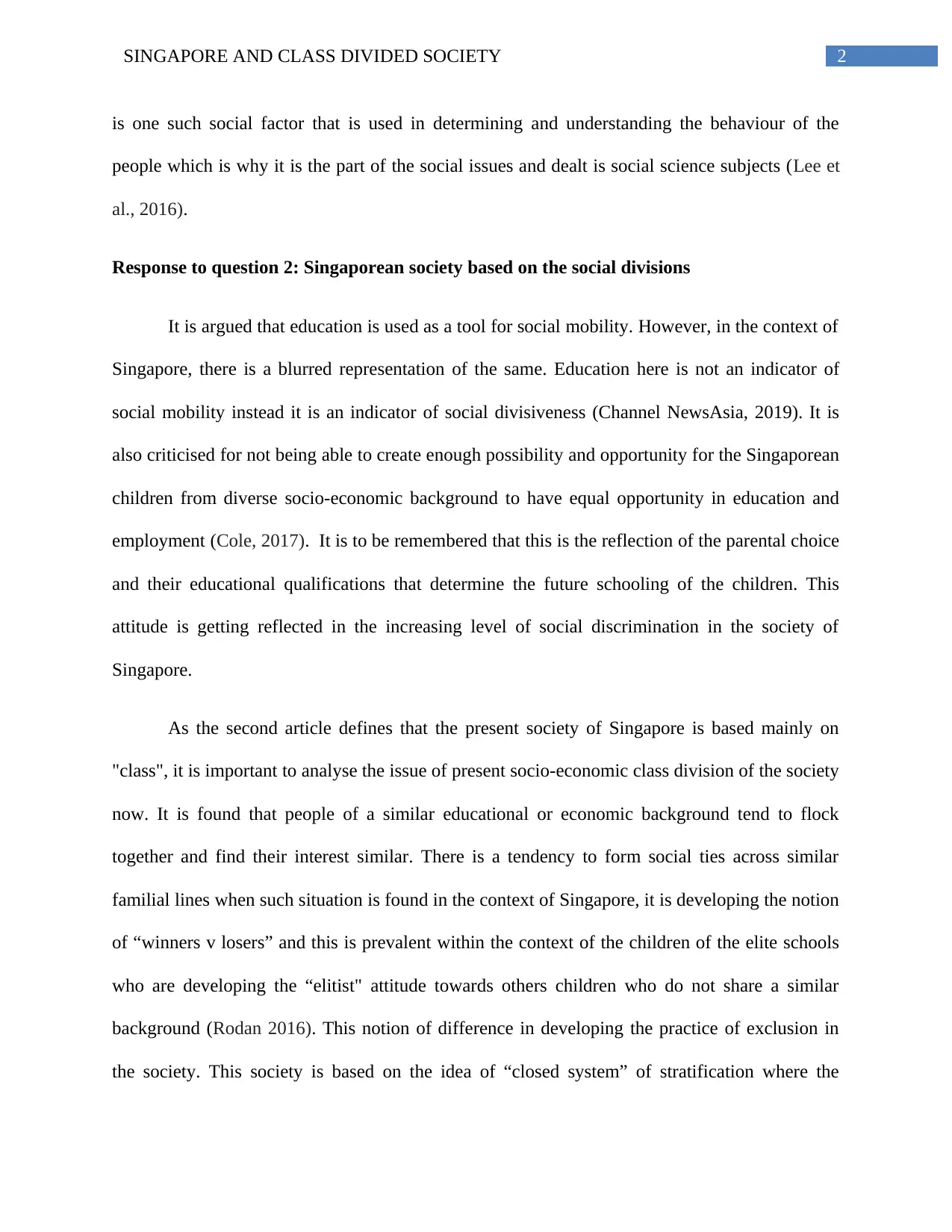
2SINGAPORE AND CLASS DIVIDED SOCIETY
is one such social factor that is used in determining and understanding the behaviour of the
people which is why it is the part of the social issues and dealt is social science subjects (Lee et
al., 2016).
Response to question 2: Singaporean society based on the social divisions
It is argued that education is used as a tool for social mobility. However, in the context of
Singapore, there is a blurred representation of the same. Education here is not an indicator of
social mobility instead it is an indicator of social divisiveness (Channel NewsAsia, 2019). It is
also criticised for not being able to create enough possibility and opportunity for the Singaporean
children from diverse socio-economic background to have equal opportunity in education and
employment (Cole, 2017). It is to be remembered that this is the reflection of the parental choice
and their educational qualifications that determine the future schooling of the children. This
attitude is getting reflected in the increasing level of social discrimination in the society of
Singapore.
As the second article defines that the present society of Singapore is based mainly on
"class", it is important to analyse the issue of present socio-economic class division of the society
now. It is found that people of a similar educational or economic background tend to flock
together and find their interest similar. There is a tendency to form social ties across similar
familial lines when such situation is found in the context of Singapore, it is developing the notion
of “winners v losers” and this is prevalent within the context of the children of the elite schools
who are developing the “elitist" attitude towards others children who do not share a similar
background (Rodan 2016). This notion of difference in developing the practice of exclusion in
the society. This society is based on the idea of “closed system” of stratification where the
is one such social factor that is used in determining and understanding the behaviour of the
people which is why it is the part of the social issues and dealt is social science subjects (Lee et
al., 2016).
Response to question 2: Singaporean society based on the social divisions
It is argued that education is used as a tool for social mobility. However, in the context of
Singapore, there is a blurred representation of the same. Education here is not an indicator of
social mobility instead it is an indicator of social divisiveness (Channel NewsAsia, 2019). It is
also criticised for not being able to create enough possibility and opportunity for the Singaporean
children from diverse socio-economic background to have equal opportunity in education and
employment (Cole, 2017). It is to be remembered that this is the reflection of the parental choice
and their educational qualifications that determine the future schooling of the children. This
attitude is getting reflected in the increasing level of social discrimination in the society of
Singapore.
As the second article defines that the present society of Singapore is based mainly on
"class", it is important to analyse the issue of present socio-economic class division of the society
now. It is found that people of a similar educational or economic background tend to flock
together and find their interest similar. There is a tendency to form social ties across similar
familial lines when such situation is found in the context of Singapore, it is developing the notion
of “winners v losers” and this is prevalent within the context of the children of the elite schools
who are developing the “elitist" attitude towards others children who do not share a similar
background (Rodan 2016). This notion of difference in developing the practice of exclusion in
the society. This society is based on the idea of “closed system” of stratification where the
⊘ This is a preview!⊘
Do you want full access?
Subscribe today to unlock all pages.

Trusted by 1+ million students worldwide
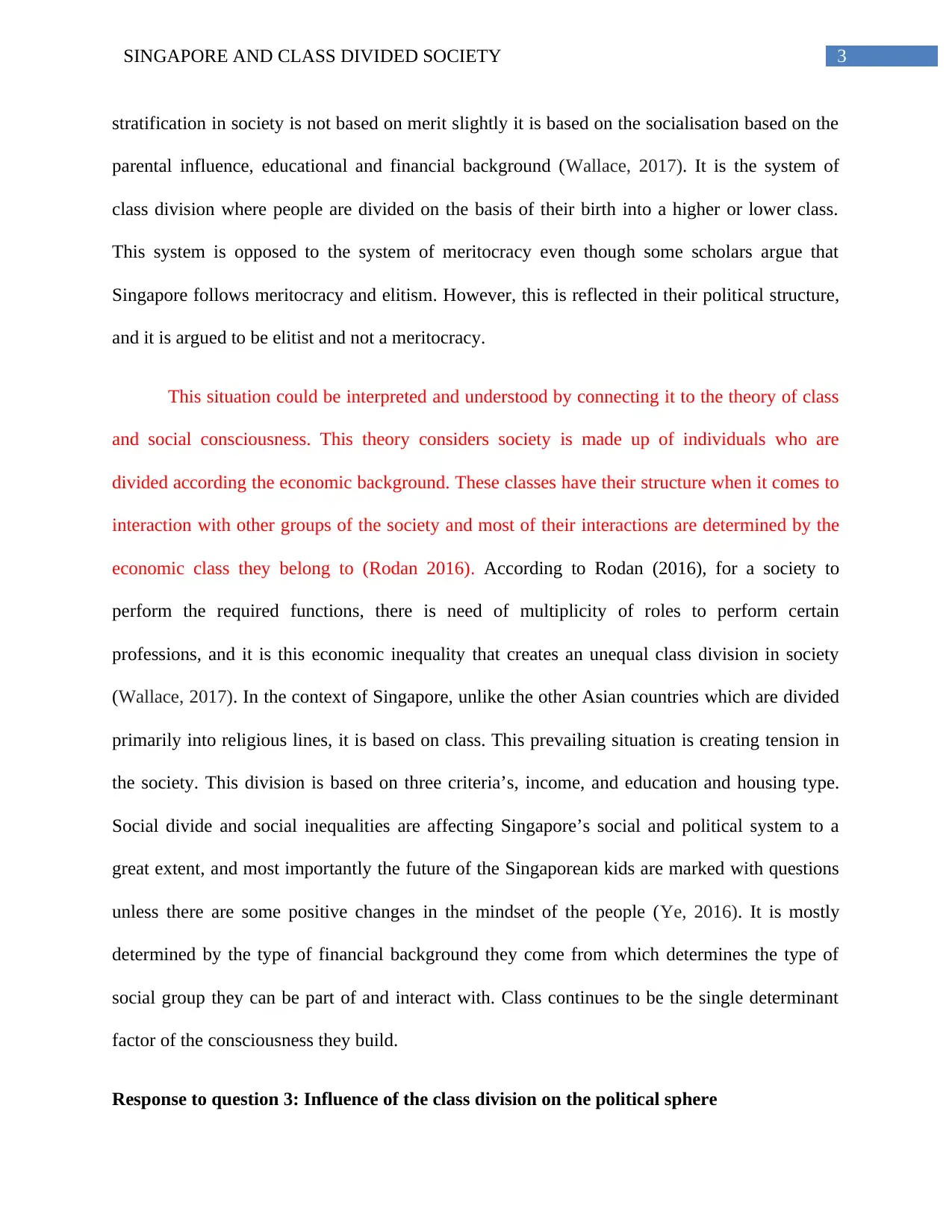
3SINGAPORE AND CLASS DIVIDED SOCIETY
stratification in society is not based on merit slightly it is based on the socialisation based on the
parental influence, educational and financial background (Wallace, 2017). It is the system of
class division where people are divided on the basis of their birth into a higher or lower class.
This system is opposed to the system of meritocracy even though some scholars argue that
Singapore follows meritocracy and elitism. However, this is reflected in their political structure,
and it is argued to be elitist and not a meritocracy.
This situation could be interpreted and understood by connecting it to the theory of class
and social consciousness. This theory considers society is made up of individuals who are
divided according the economic background. These classes have their structure when it comes to
interaction with other groups of the society and most of their interactions are determined by the
economic class they belong to (Rodan 2016). According to Rodan (2016), for a society to
perform the required functions, there is need of multiplicity of roles to perform certain
professions, and it is this economic inequality that creates an unequal class division in society
(Wallace, 2017). In the context of Singapore, unlike the other Asian countries which are divided
primarily into religious lines, it is based on class. This prevailing situation is creating tension in
the society. This division is based on three criteria’s, income, and education and housing type.
Social divide and social inequalities are affecting Singapore’s social and political system to a
great extent, and most importantly the future of the Singaporean kids are marked with questions
unless there are some positive changes in the mindset of the people (Ye, 2016). It is mostly
determined by the type of financial background they come from which determines the type of
social group they can be part of and interact with. Class continues to be the single determinant
factor of the consciousness they build.
Response to question 3: Influence of the class division on the political sphere
stratification in society is not based on merit slightly it is based on the socialisation based on the
parental influence, educational and financial background (Wallace, 2017). It is the system of
class division where people are divided on the basis of their birth into a higher or lower class.
This system is opposed to the system of meritocracy even though some scholars argue that
Singapore follows meritocracy and elitism. However, this is reflected in their political structure,
and it is argued to be elitist and not a meritocracy.
This situation could be interpreted and understood by connecting it to the theory of class
and social consciousness. This theory considers society is made up of individuals who are
divided according the economic background. These classes have their structure when it comes to
interaction with other groups of the society and most of their interactions are determined by the
economic class they belong to (Rodan 2016). According to Rodan (2016), for a society to
perform the required functions, there is need of multiplicity of roles to perform certain
professions, and it is this economic inequality that creates an unequal class division in society
(Wallace, 2017). In the context of Singapore, unlike the other Asian countries which are divided
primarily into religious lines, it is based on class. This prevailing situation is creating tension in
the society. This division is based on three criteria’s, income, and education and housing type.
Social divide and social inequalities are affecting Singapore’s social and political system to a
great extent, and most importantly the future of the Singaporean kids are marked with questions
unless there are some positive changes in the mindset of the people (Ye, 2016). It is mostly
determined by the type of financial background they come from which determines the type of
social group they can be part of and interact with. Class continues to be the single determinant
factor of the consciousness they build.
Response to question 3: Influence of the class division on the political sphere
Paraphrase This Document
Need a fresh take? Get an instant paraphrase of this document with our AI Paraphraser
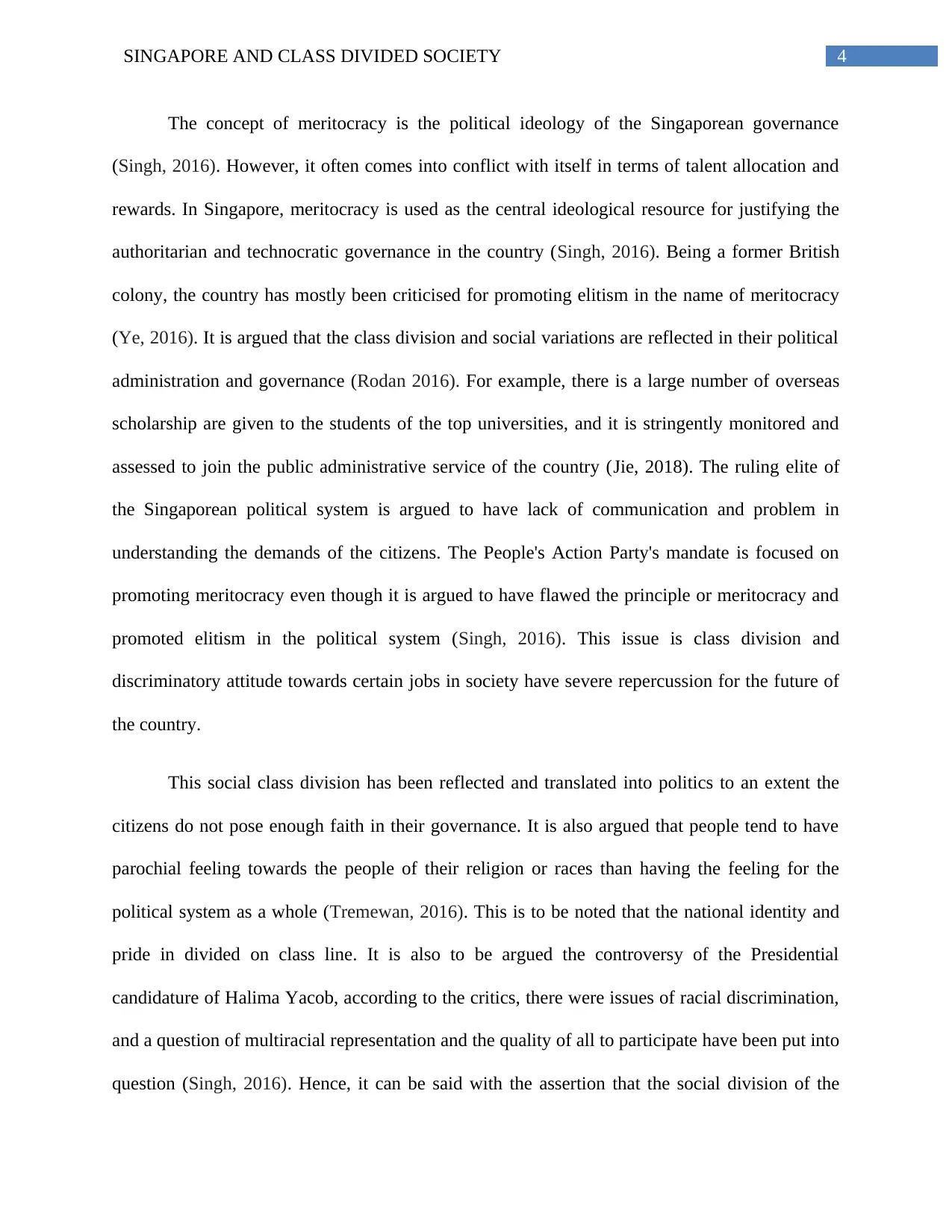
4SINGAPORE AND CLASS DIVIDED SOCIETY
The concept of meritocracy is the political ideology of the Singaporean governance
(Singh, 2016). However, it often comes into conflict with itself in terms of talent allocation and
rewards. In Singapore, meritocracy is used as the central ideological resource for justifying the
authoritarian and technocratic governance in the country (Singh, 2016). Being a former British
colony, the country has mostly been criticised for promoting elitism in the name of meritocracy
(Ye, 2016). It is argued that the class division and social variations are reflected in their political
administration and governance (Rodan 2016). For example, there is a large number of overseas
scholarship are given to the students of the top universities, and it is stringently monitored and
assessed to join the public administrative service of the country (Jie, 2018). The ruling elite of
the Singaporean political system is argued to have lack of communication and problem in
understanding the demands of the citizens. The People's Action Party's mandate is focused on
promoting meritocracy even though it is argued to have flawed the principle or meritocracy and
promoted elitism in the political system (Singh, 2016). This issue is class division and
discriminatory attitude towards certain jobs in society have severe repercussion for the future of
the country.
This social class division has been reflected and translated into politics to an extent the
citizens do not pose enough faith in their governance. It is also argued that people tend to have
parochial feeling towards the people of their religion or races than having the feeling for the
political system as a whole (Tremewan, 2016). This is to be noted that the national identity and
pride in divided on class line. It is also to be argued the controversy of the Presidential
candidature of Halima Yacob, according to the critics, there were issues of racial discrimination,
and a question of multiracial representation and the quality of all to participate have been put into
question (Singh, 2016). Hence, it can be said with the assertion that the social division of the
The concept of meritocracy is the political ideology of the Singaporean governance
(Singh, 2016). However, it often comes into conflict with itself in terms of talent allocation and
rewards. In Singapore, meritocracy is used as the central ideological resource for justifying the
authoritarian and technocratic governance in the country (Singh, 2016). Being a former British
colony, the country has mostly been criticised for promoting elitism in the name of meritocracy
(Ye, 2016). It is argued that the class division and social variations are reflected in their political
administration and governance (Rodan 2016). For example, there is a large number of overseas
scholarship are given to the students of the top universities, and it is stringently monitored and
assessed to join the public administrative service of the country (Jie, 2018). The ruling elite of
the Singaporean political system is argued to have lack of communication and problem in
understanding the demands of the citizens. The People's Action Party's mandate is focused on
promoting meritocracy even though it is argued to have flawed the principle or meritocracy and
promoted elitism in the political system (Singh, 2016). This issue is class division and
discriminatory attitude towards certain jobs in society have severe repercussion for the future of
the country.
This social class division has been reflected and translated into politics to an extent the
citizens do not pose enough faith in their governance. It is also argued that people tend to have
parochial feeling towards the people of their religion or races than having the feeling for the
political system as a whole (Tremewan, 2016). This is to be noted that the national identity and
pride in divided on class line. It is also to be argued the controversy of the Presidential
candidature of Halima Yacob, according to the critics, there were issues of racial discrimination,
and a question of multiracial representation and the quality of all to participate have been put into
question (Singh, 2016). Hence, it can be said with the assertion that the social division of the
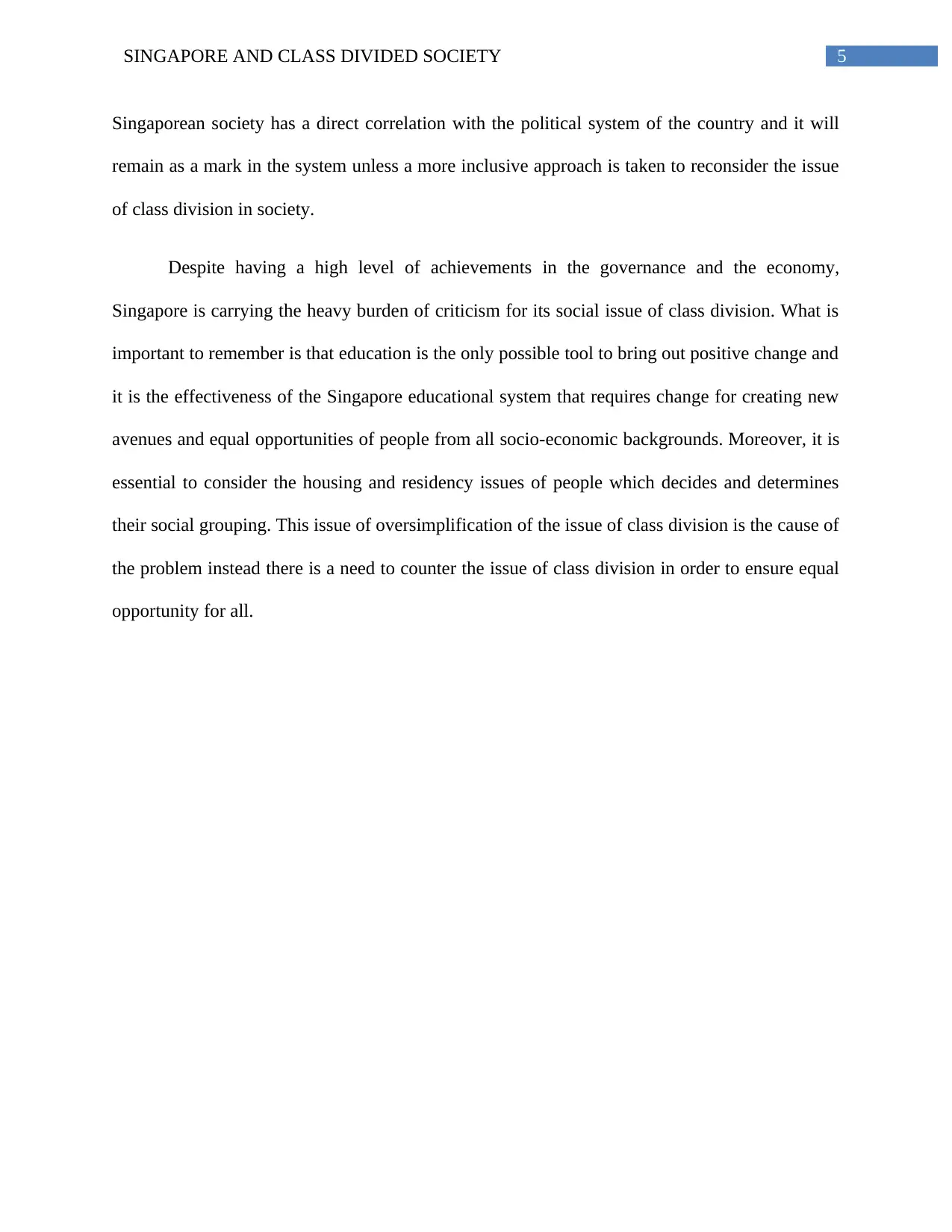
5SINGAPORE AND CLASS DIVIDED SOCIETY
Singaporean society has a direct correlation with the political system of the country and it will
remain as a mark in the system unless a more inclusive approach is taken to reconsider the issue
of class division in society.
Despite having a high level of achievements in the governance and the economy,
Singapore is carrying the heavy burden of criticism for its social issue of class division. What is
important to remember is that education is the only possible tool to bring out positive change and
it is the effectiveness of the Singapore educational system that requires change for creating new
avenues and equal opportunities of people from all socio-economic backgrounds. Moreover, it is
essential to consider the housing and residency issues of people which decides and determines
their social grouping. This issue of oversimplification of the issue of class division is the cause of
the problem instead there is a need to counter the issue of class division in order to ensure equal
opportunity for all.
Singaporean society has a direct correlation with the political system of the country and it will
remain as a mark in the system unless a more inclusive approach is taken to reconsider the issue
of class division in society.
Despite having a high level of achievements in the governance and the economy,
Singapore is carrying the heavy burden of criticism for its social issue of class division. What is
important to remember is that education is the only possible tool to bring out positive change and
it is the effectiveness of the Singapore educational system that requires change for creating new
avenues and equal opportunities of people from all socio-economic backgrounds. Moreover, it is
essential to consider the housing and residency issues of people which decides and determines
their social grouping. This issue of oversimplification of the issue of class division is the cause of
the problem instead there is a need to counter the issue of class division in order to ensure equal
opportunity for all.
⊘ This is a preview!⊘
Do you want full access?
Subscribe today to unlock all pages.

Trusted by 1+ million students worldwide
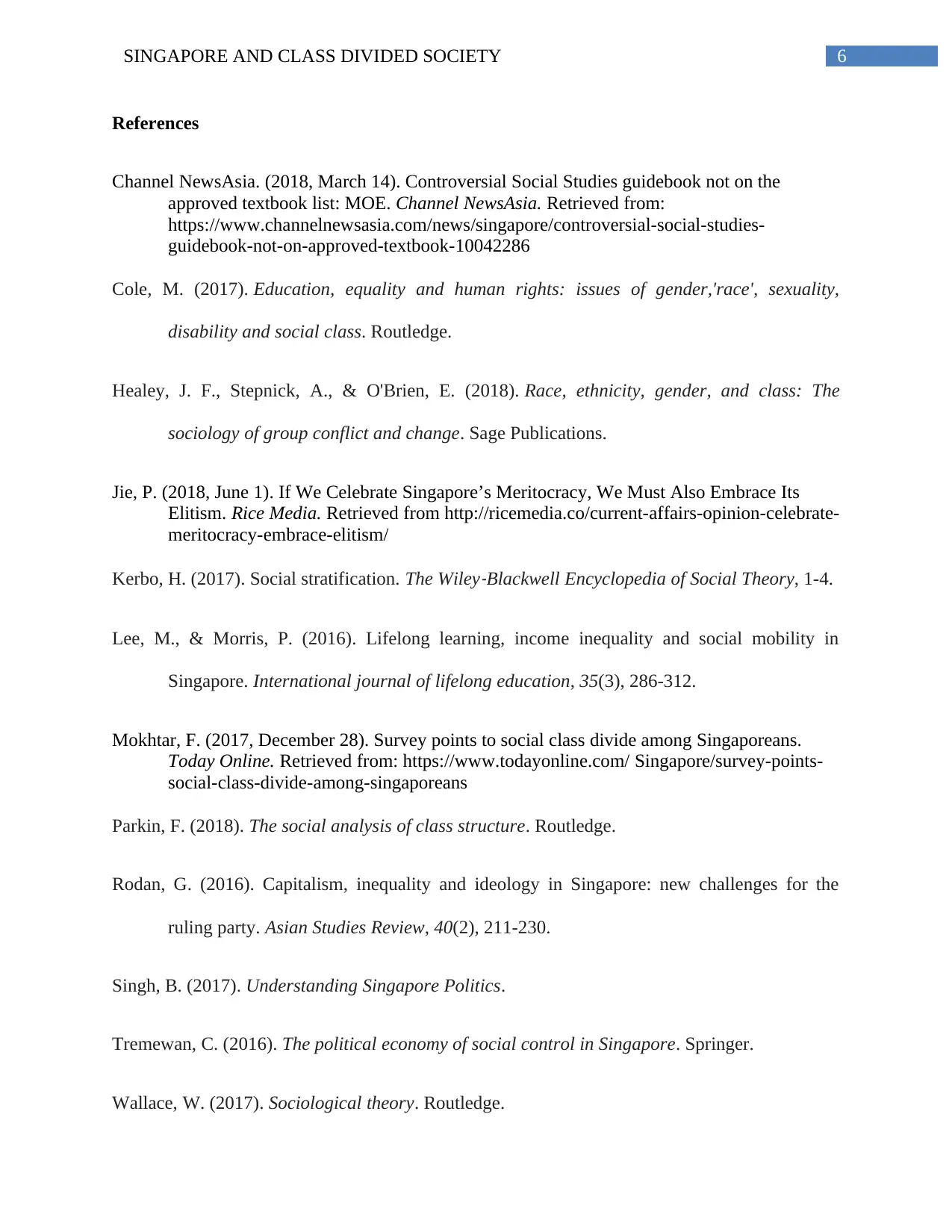
6SINGAPORE AND CLASS DIVIDED SOCIETY
References
Channel NewsAsia. (2018, March 14). Controversial Social Studies guidebook not on the
approved textbook list: MOE. Channel NewsAsia. Retrieved from:
https://www.channelnewsasia.com/news/singapore/controversial-social-studies-
guidebook-not-on-approved-textbook-10042286
Cole, M. (2017). Education, equality and human rights: issues of gender,'race', sexuality,
disability and social class. Routledge.
Healey, J. F., Stepnick, A., & O'Brien, E. (2018). Race, ethnicity, gender, and class: The
sociology of group conflict and change. Sage Publications.
Jie, P. (2018, June 1). If We Celebrate Singapore’s Meritocracy, We Must Also Embrace Its
Elitism. Rice Media. Retrieved from http://ricemedia.co/current-affairs-opinion-celebrate-
meritocracy-embrace-elitism/
Kerbo, H. (2017). Social stratification. The Wiley
‐Blackwell Encyclopedia of Social Theory, 1-4.
Lee, M., & Morris, P. (2016). Lifelong learning, income inequality and social mobility in
Singapore. International journal of lifelong education, 35(3), 286-312.
Mokhtar, F. (2017, December 28). Survey points to social class divide among Singaporeans.
Today Online. Retrieved from: https://www.todayonline.com/ Singapore/survey-points-
social-class-divide-among-singaporeans
Parkin, F. (2018). The social analysis of class structure. Routledge.
Rodan, G. (2016). Capitalism, inequality and ideology in Singapore: new challenges for the
ruling party. Asian Studies Review, 40(2), 211-230.
Singh, B. (2017). Understanding Singapore Politics.
Tremewan, C. (2016). The political economy of social control in Singapore. Springer.
Wallace, W. (2017). Sociological theory. Routledge.
References
Channel NewsAsia. (2018, March 14). Controversial Social Studies guidebook not on the
approved textbook list: MOE. Channel NewsAsia. Retrieved from:
https://www.channelnewsasia.com/news/singapore/controversial-social-studies-
guidebook-not-on-approved-textbook-10042286
Cole, M. (2017). Education, equality and human rights: issues of gender,'race', sexuality,
disability and social class. Routledge.
Healey, J. F., Stepnick, A., & O'Brien, E. (2018). Race, ethnicity, gender, and class: The
sociology of group conflict and change. Sage Publications.
Jie, P. (2018, June 1). If We Celebrate Singapore’s Meritocracy, We Must Also Embrace Its
Elitism. Rice Media. Retrieved from http://ricemedia.co/current-affairs-opinion-celebrate-
meritocracy-embrace-elitism/
Kerbo, H. (2017). Social stratification. The Wiley
‐Blackwell Encyclopedia of Social Theory, 1-4.
Lee, M., & Morris, P. (2016). Lifelong learning, income inequality and social mobility in
Singapore. International journal of lifelong education, 35(3), 286-312.
Mokhtar, F. (2017, December 28). Survey points to social class divide among Singaporeans.
Today Online. Retrieved from: https://www.todayonline.com/ Singapore/survey-points-
social-class-divide-among-singaporeans
Parkin, F. (2018). The social analysis of class structure. Routledge.
Rodan, G. (2016). Capitalism, inequality and ideology in Singapore: new challenges for the
ruling party. Asian Studies Review, 40(2), 211-230.
Singh, B. (2017). Understanding Singapore Politics.
Tremewan, C. (2016). The political economy of social control in Singapore. Springer.
Wallace, W. (2017). Sociological theory. Routledge.
Paraphrase This Document
Need a fresh take? Get an instant paraphrase of this document with our AI Paraphraser
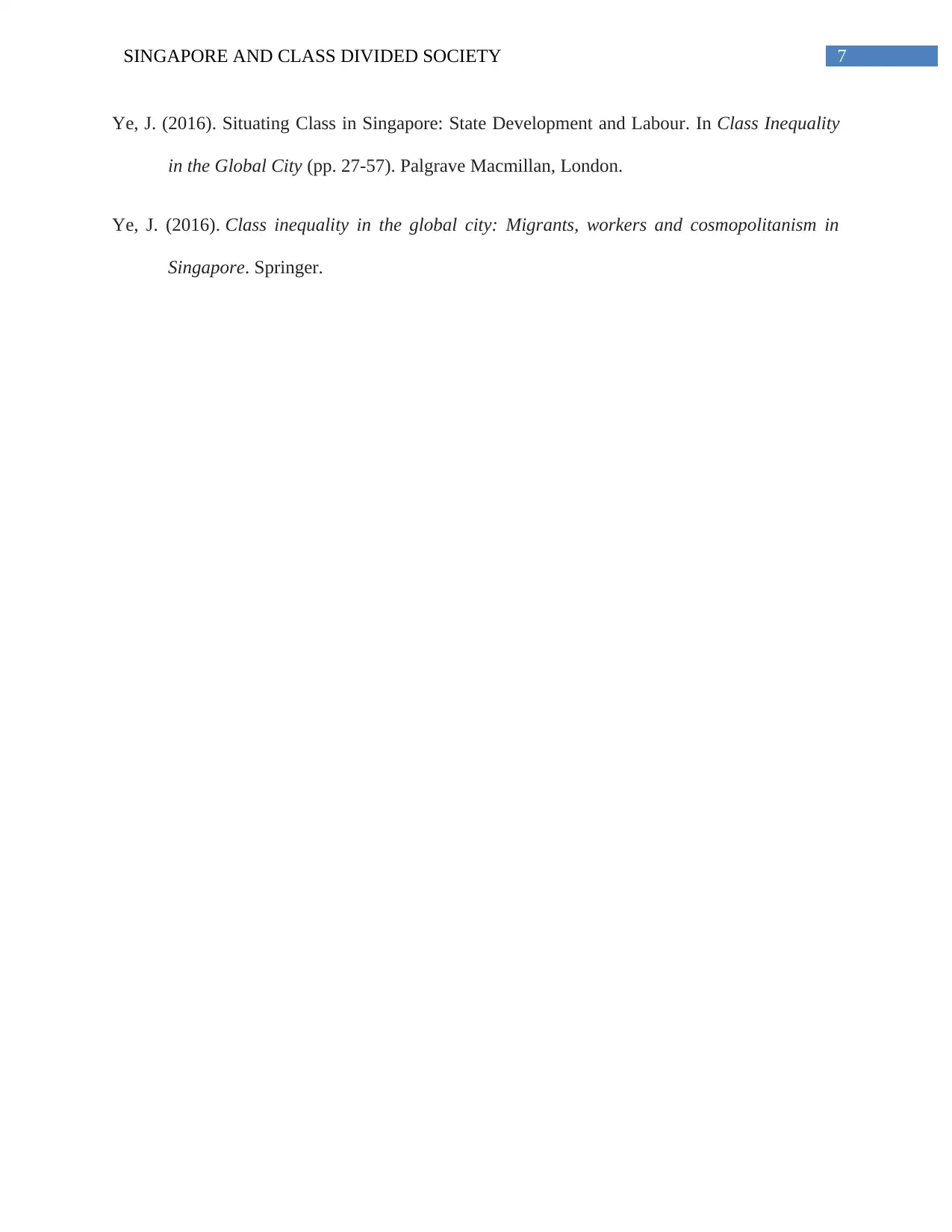
7SINGAPORE AND CLASS DIVIDED SOCIETY
Ye, J. (2016). Situating Class in Singapore: State Development and Labour. In Class Inequality
in the Global City (pp. 27-57). Palgrave Macmillan, London.
Ye, J. (2016). Class inequality in the global city: Migrants, workers and cosmopolitanism in
Singapore. Springer.
Ye, J. (2016). Situating Class in Singapore: State Development and Labour. In Class Inequality
in the Global City (pp. 27-57). Palgrave Macmillan, London.
Ye, J. (2016). Class inequality in the global city: Migrants, workers and cosmopolitanism in
Singapore. Springer.
1 out of 8
Related Documents
Your All-in-One AI-Powered Toolkit for Academic Success.
+13062052269
info@desklib.com
Available 24*7 on WhatsApp / Email
![[object Object]](/_next/static/media/star-bottom.7253800d.svg)
Unlock your academic potential
Copyright © 2020–2026 A2Z Services. All Rights Reserved. Developed and managed by ZUCOL.





